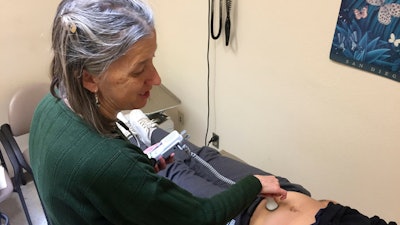
SANTA FE, N.M. (AP) — Most New Mexico families with infants exposed to illicit drugs, marijuana and alcohol in the womb have been forgoing subsidized addiction treatment and other voluntary support services since the state's shift in 2020 that halted automatic referrals to protective services, a new study indicated on Friday.
The Legislature's budget and accountability office told a panel of lawmakers that New Mexico's revamped response to substance-exposed newborns — changes implemented in response to federal drug-abuse legislation — succeeded in keeping more parents together with their children, to avoid trauma associated with separation.
At the same time, evaluators said the approach does not fulfill its purpose of keeping newborns safe and directing families to treatment, as parents miss or decline services ranging from mental health counseling to home visits by nurses aimed at improving the health and development of infants. The study notes that drug and alcohol use by parents is a major risk factor in neglect and abuse of children.
"The vast majority of (these) families are not receiving support services or substance-use treatment," said Ryan Tolman, a program evaluator with the Legislature's budget and accountability office.
He said rates of newborns with substance-withdrawal symptoms in New Mexico have climbed to more than twice the national average. And yet only one-in-seven local families with substance-exposed newborns accepts referrals to addiction treatment, the study found.
Home visiting services for infants reaches about 50 families out of about 1,300 each year that receive state-mandated plans of care for substance-exposed newborns.
Even when families do accept services, the study cited obstacles to monitoring and tracking long-term participation — which is not required by law. Other states including Arizona require child protective services to monitor progress and participation when referrals are made for substance-exposed infants. Illinois has extensive requirements for meetings between caseworkers and parents.
The new findings arrive amid an overhaul of the state's foster care and child welfare agency. New Mexico's repeat rate of reported child abuse cases is among the worst in the country, amid chronic workforce shortages in the child welfare system.
The new approach to substance-exposed newborns was enacted by New Mexico lawmakers in 2019 at the outset of Gov. Michelle Lujan Grisham's first term in office, requiring that hospitals and birthing centers develop a plan of care for infants exposed to drugs and alcohol before birth, in coordination with medical providers, insurers and state agencies.
The administration of Gov. Michelle Lujan defended its oversight of the program in a written response to the new study, saying it has "improved outcomes for hundreds of infants and families," and that infant mortality rates under the program are similar to the general population.
Still, the administration wants to hire 20 new professional "navigators" to help families with substance-exposed newborns access services, said Teresa Casados, secretary of the Children, Youth, and Families Department that leads oversight.
"That's really my hope, is that we can get navigators out into the communities that are more engaged with families," Casados said.
Leslie Hayes, a physician in Española who frequently treats opioid addiction among pregnant women with regimens including anti-craving medication, said many new parents hesitate to accept home visits from nurses — in part out of embarrassment about ordinary household messiness.
She said it's crucial to devote resources not only to babies but also to the well-being of their parents.
"I find with pregnant women in general and especially with postpartum women with substance-use disorders, they get so focused on the baby that they forget to take care of themselves," said Hayes, who works for El Centro Family Health at its Rio Arriba Health Commons. "Some of them end up relapsing and dying."






















